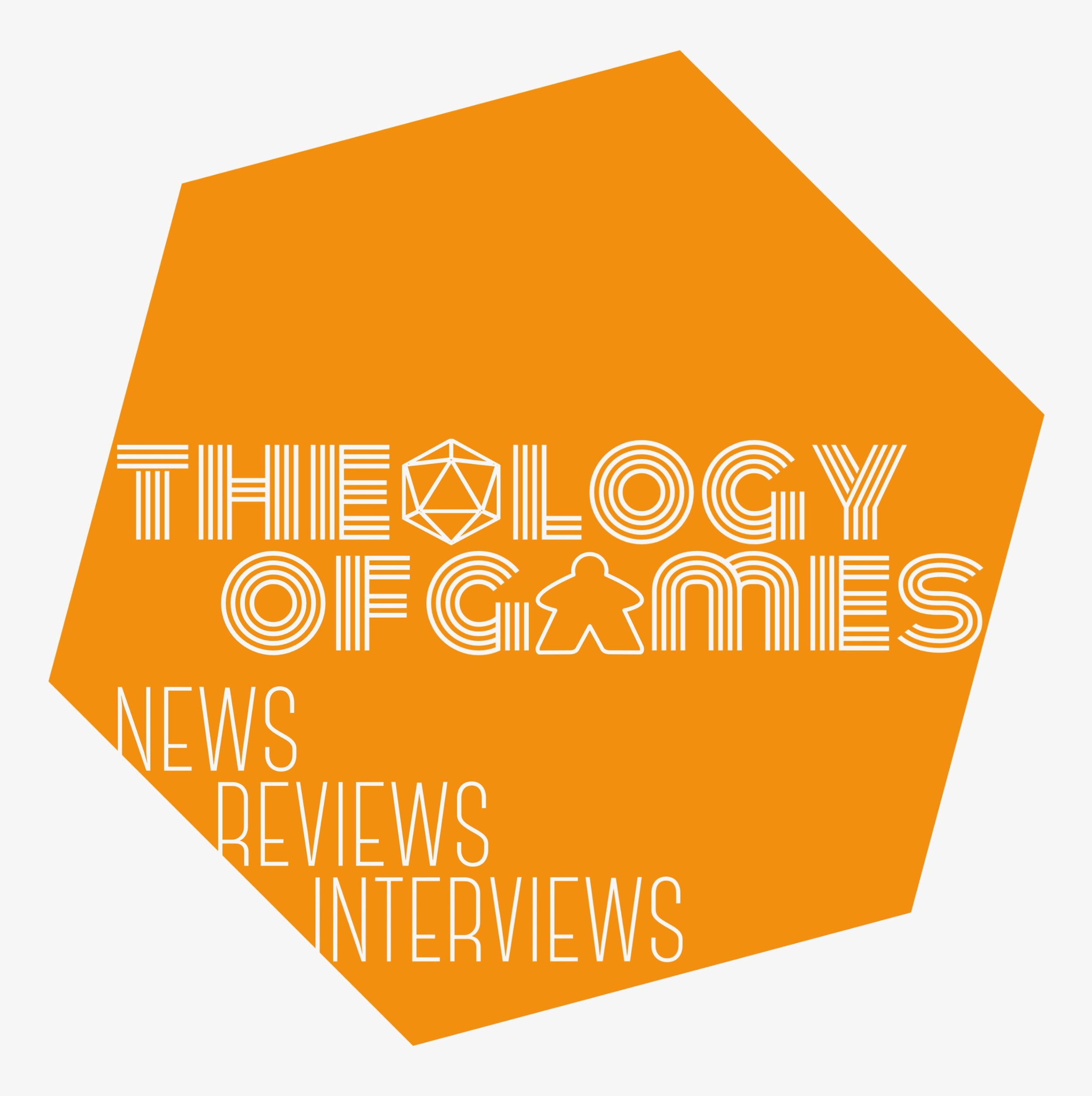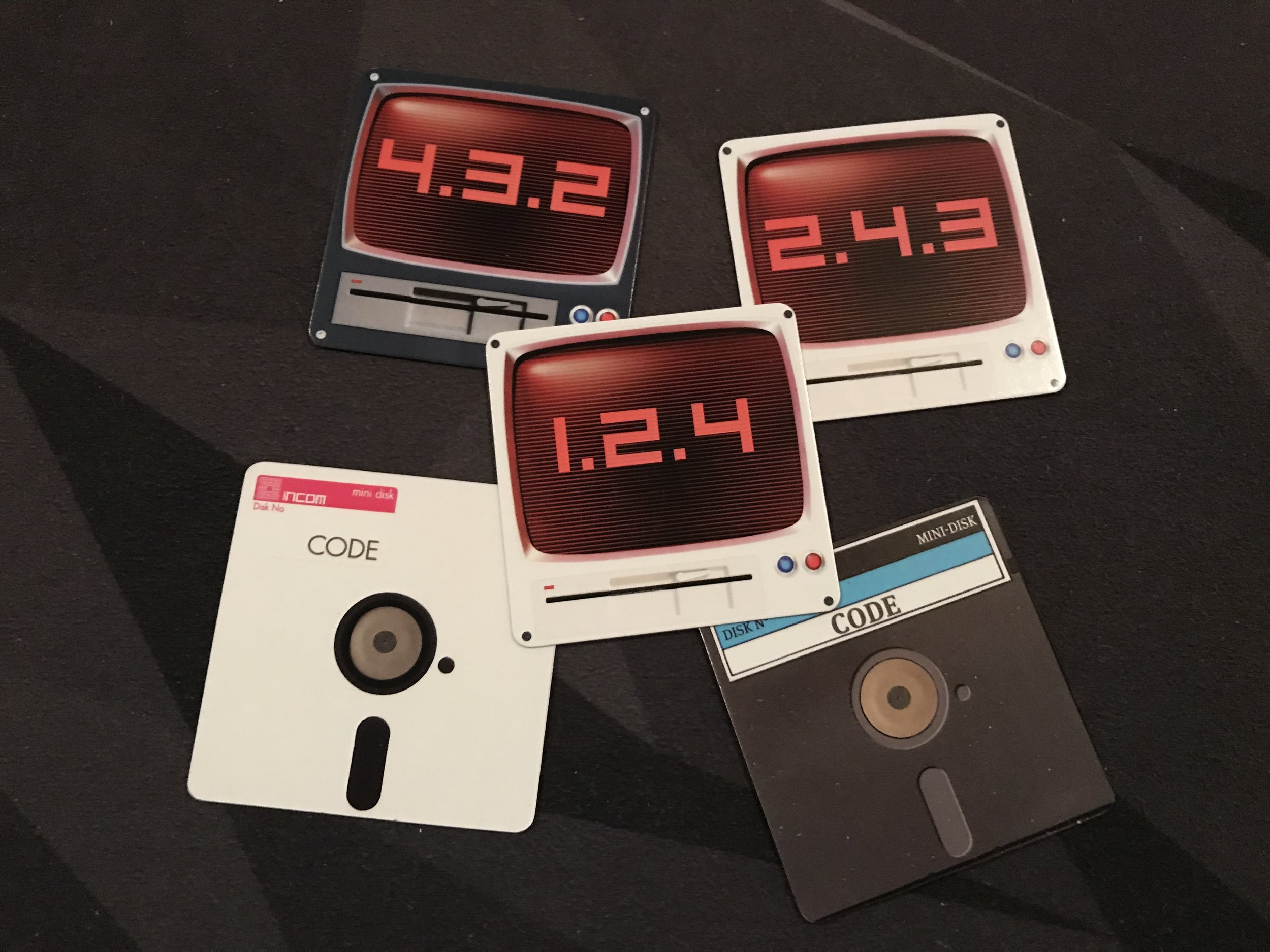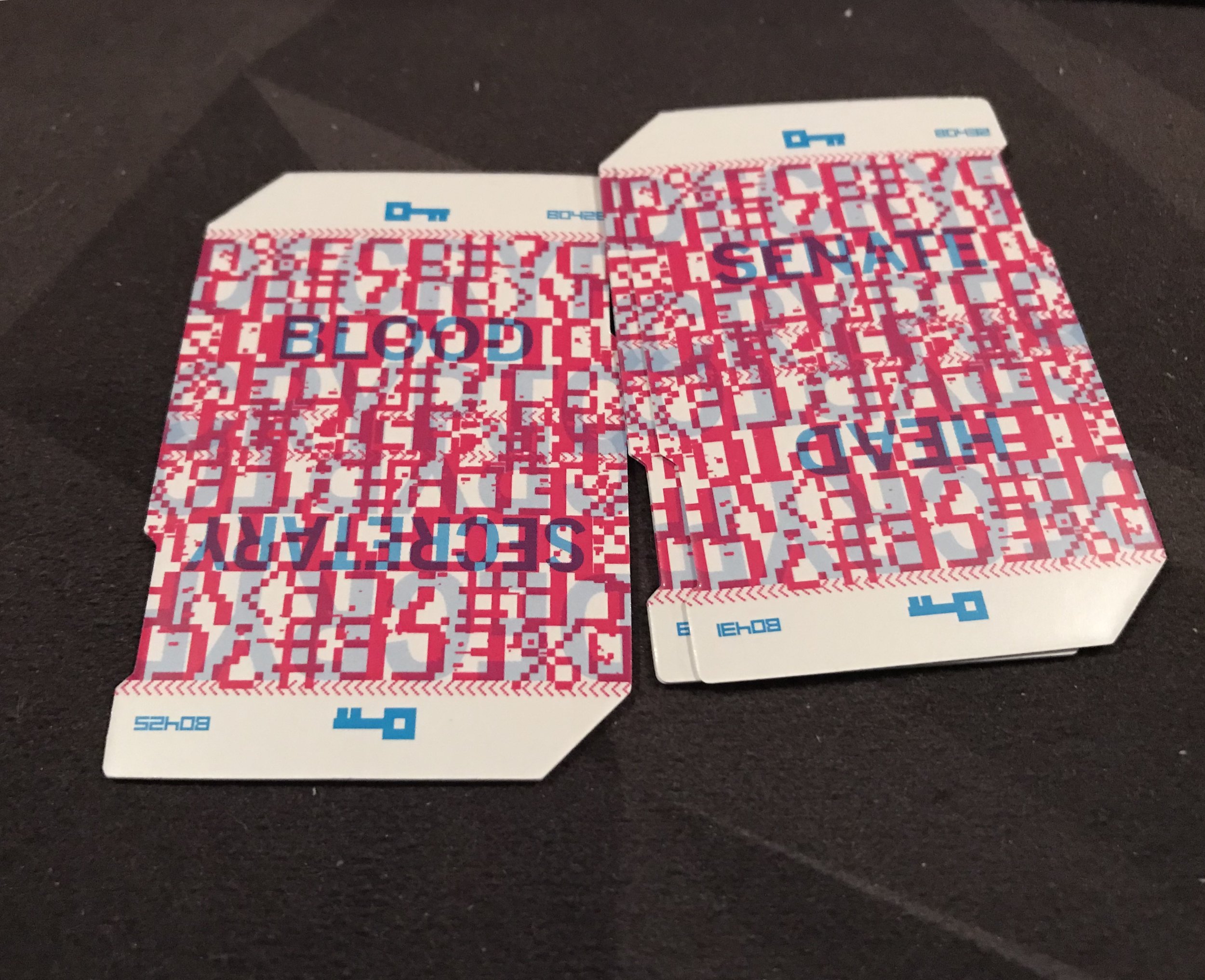Coming In from the Cold--A Single-Take Review of Decrypto
/I never thought I'd be a party game guy. But here I am, 14 or so years into this hobby, and I play some sort of party game nearly every week. Time's Up. The Resistance. Werewords. Codenames. I keep thinking I don't need another one. And I thought the same thing when I first saw Decrypto, a team-based game of giving clues and intercepting codes. Has Decrpyto's fun been compromised, or is it the spy who loved me? Let's find out!
The Objective
A team wins by being the first to Intercept the other team's clues twice.
Or, a team can lose by Miscommunicating twice.
Code cards: "Dad, what even are those...?"
The Components
- 110 Keyword cards
- 48 Code cards (24 each in black and white)
- 2 screens
- 4 Interception tokens
- 4 Miscommunication tokens
- 1 Sand timer
- 50 Note sheets
The Setup
Split the players into two teams, and each side takes a screen and places four Keyword cards into it. These cards each contain a word, and those words don't change throughout the game. Each team also takes one of the stacks of Code cards, and a Note sheet.
The Gameplay
One person will take a turn to be the Encryptor, or clue-giver. He or she will draw a Code card, which has some combination of 3 of the 4 words, represented numerically: 4.2.3., 1.3.2., 1.2.3., etc. They now have to give clues, in an effort to get their team to guess the correct combination of words, in the correct order.
This is happening on both teams simultaneously.
There are a few rules for giving clues:
- You have great leeway in giving clues. It can be a single word, a phrase, or sentence. The rules even say you can even "hum, dance, or mime it." I've yet to see someone do that....
- The clues have to refer to the meaning of the word. You can't give a clue that only refers to the spelling of the word, the number of letters in it, its position in your screen, or a word that rhymes with the correct word.
- The clues have to be public knowledge. It can be as obscure public knowledge, but it can't be some kind of private secret only you and your partner would know.
- Each clue in each round has to be different.
After each Encryptor has written his or her three clues, the White team Encryptor reads their clues aloud. Then the rest of the White team, and the Black team, try to guess what they think the Code is by writing it down. The opposing team gets to guess first. If they're correct, they've Intercepted the code, and are halfway to winning. If they don't guess it correctly, the rest of the White team gives their guess. If they're wrong, the team has Miscommunicated, and are halfway to losing the game. If they're correct, nothing happens.
Now you do the whole process again with the Black team reading their clues aloud and the White team trying to Intercept.
(The intercepting attempt doesn't happen on the very first round. There's no information available and it would be a blind guess.)
At the end of the round you check to see if a team has 2 Interception or Miscommunication tokens. If neither team has 2 of those tokens, you shuffle the Code card back into the deck and a new player becomes the Encryptor for the next round.
Ties can happen.
- If a team has both 2 Miscommunication tokens and 2 Intercept tokens at the end of a round, or
- if both teams collect their second Miscommunication in the same round, or
- if both teams collect their second Interception in the same round, or
- if neither team has lost by the end of the 8th round.
If this happens, each team tries to guess the other team's Keywords, and the winner is the team that guesses the most correctly.
Here's a quick example. Let's say our 4 Keywords are, in this order, Ink, Woman, Wolf, and Olympics. I draw a Code card with "3.4.1" on it. So I might give the clues Attack, Flame, Paper.
On a subsequent turn, the Code card might be "2, 3, 4" so the Encryptor gives the clues Shoes, Cave, Flag.
As you can see, each round each team gets more information about some of the Keywords. So it helps teams figure out what the Keywords might be, which helps them possibly Intercept.
And that's Decrypto!
The Verdict
I LOVE Decrypto. Every game has been tense and absorbing. I want to be clever but I don't want to be too clever because I may sink our team. I love looking at the clues I know the other team has, and then thinking of a word that sends them on a wild goose chase.
Just last night, for example, we had the words I gave above. I knew they were moving in on guessing that the first word (Ink) was Book, or something close to it. So I gave the clue Sansa--a character from A Game of Thrones. I was hoping it would lead them toward what they thought was Book, while steering my team toward Wolf (an animal closely tied to that character). It worked perfectly, and it was very satisfying to see.
The game is full of those moments and opportunities, and I love that about it. They're closing in. You're closing in. It's a game of cat and mouse. Or moose and squirrel. I dunno. I just know it's terrific.
There's also a ton of replayability. The game comes with 100 cards, and each card has 4 words on it. You'll never play the same game twice.
If there's one ding I have, it's that Decrypto can cause people to take a long time coming up with clues. Codenames can have this problem too, but you'll almost always have a fallback: You're looking for a 3 or 4 clue, but you have a solid 1 or 2 clue you can give if you take too long. With Decrypto, that's not really possible--either you have a clue or you don't. The game comes with a ridiculously short timer, but it's not helpful because you can't just make people think faster. Despite that, I still give Decrypto a perfect 10.
I should also note that the rulebook is terrible. It's like they had monkeys banging away at typewriters, and published whatever they came up with. Okay, it's not that bad, but it's bad. But once you learn the game you'll never have to reference it again, so don't sweat it.
What almost makes up for the terrible rulebook is the cool art design. It feels retro cool, with boxy, anthropomorphic computer monitors, and Code card back that look like floppy disks. It's fun and sets a tone.
Firestone's Final Verdict
It's not as approachable or nongamer friendly as Codenames or Chameleon, but I think Decrypto surpasses them all. It's thinky, tense, and full of opportunities to be clever--or to hang yourself by being too clever. I'll play this any time, and I've recommended it to countless people. I recommend it to you, too.
Have you played Decrypto? What do you think about it? Let us know in the comments, and thanks for reading!



















